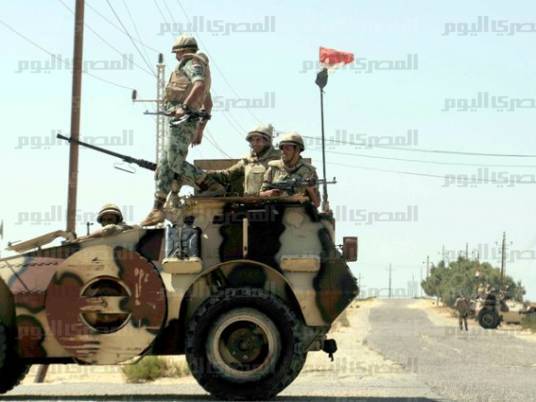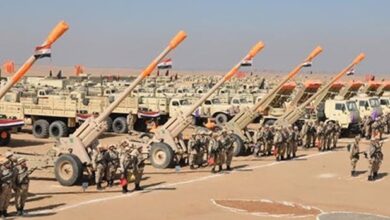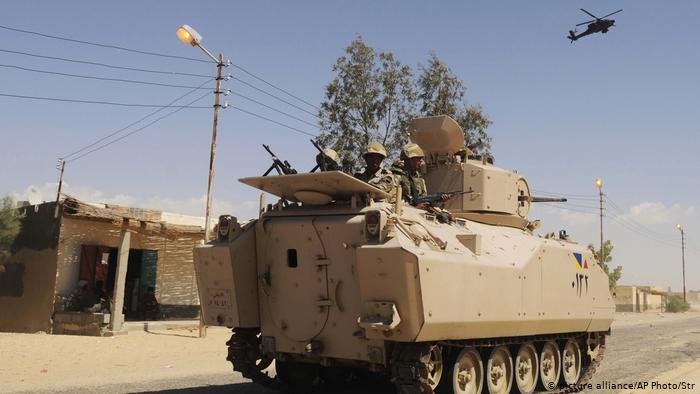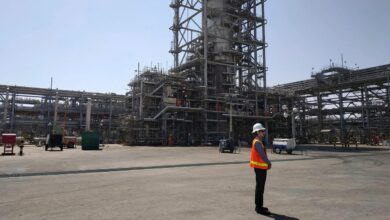
Egyptian troops and helicopter gunships attacked Islamist militants in the Sinai Peninsula on Friday in a drive to crush a security threat now spilling over into the rest of the country.
Three soldiers were wounded in clashes in three separate villages, security officials said.
Islamist militant attacks have increased in the desert region adjoining Israel and the Gaza Strip and elsewhere in Egypt since the army ousted Islamist President Mohamed Mursi on July 3 following mass protests against his rule.
Rocket and grenade attacks on soldiers and policemen take place in the Sinai nearly every day and about 50 have been killed since July. A Sinai-based militant group claimed responsibility for a failed suicide bombing attack on the interior minister in Cairo last week.
In the latest operation, security forces detained two wanted men and seized a rocket, dynamite used to build bombs, and 200 books on Islamic fundamentalism, security officials said.
Authorities are also focused on Mursi's Muslim Brotherhood, which had held power for just over a year when Mursi was ousted.
Thousands of pro-Mursi protesters marched after Friday prayers in several areas of Cairo after authorities boosted security in sites where crowds had gathered in the past.
In Alexandria, one protester died from a gunshot wound and four others were wounded, medical and security sources said.
Demonstrations were also held in the cities of Fayoum, Alexandria, Assiut and Qena. State television said clashes broke out between Brotherhood supporters and residents of the Nile Delta town of Mahala.
CRACKDOWN ON BROTHERHOOD
Security forces have killed hundreds of Brotherhood supporters and arrested thousands in one of the toughest crackdowns the group has faced in its 85-year history. It denies accusations that it has carried out terrorist acts.
Many Egyptians, disillusioned with Mursi's moves to give himself sweeping powers and his mismanagement of the economy, were relieved when he was removed and then detained.
The general who toppled him and promised a political "road map" that would lead to elections early next year, army chief General Abdel Fattah al-Sisi, enjoys widespread popularity. Speculation is growing that he will run for president.
Many Brotherhood members went underground. But some still take part in marches, a risky step in a country where the authorities seem determined to crush the Islamists.
"Down, down with military rule!" shouted the demonstrators in Cairo.
Some walked to a military hospital and wrote graffiti on a wall reading: "The coup is terrorism and Sisi is a killer."
Al Qaeda, has taken notice of the political turmoil in Egypt, a U.S. ally.
Al Qaeda leader Ayman al-Zawahri has described the army-installed government's crackdown against the Brotherhood as a "brutal crime" and urged Egyptians to resist what he called a campaign against Islam.
In an audio speech released a day after the 12th anniversary of al Qaeda's September 11 strikes on the United States, the former doctor condemned last month's violent break-up of protest camps in Cairo, in which hundreds were killed, and the arrests of Islamists.
"This is an episode of a long drama that awaits Egyptians if they don't unite to implement sharia Islamic law and free their country," said Zawahri, himself an Egyptian who was tortured by authorities under ousted strongman Hosni Mubarak.
Zawahri also said the United States was conspiring in Egypt and called on Egyptians to fight the "oppression".
If militant groups now turn their sights on Cairo, the move would further hurt the tourism industry and reeling economy.




